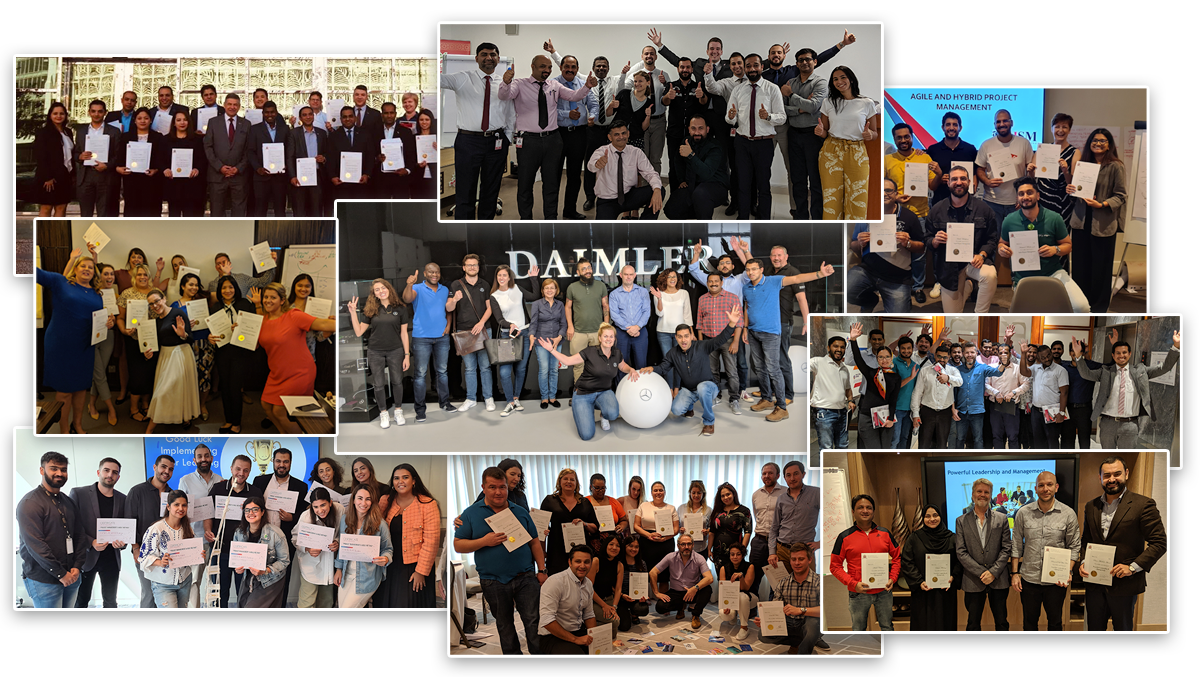Leadership is not just about having authority or holding a title. It is about influence, direction, and the ability to inspire others towards a common goal.
If you lead a team, manage a project, or want to grow as a leader, understanding leadership is important. It can help you make a bigger impact.
This guide includes everything you need to be a better leader. It covers key theories, leadership styles, practical tips and strategic thinking.
Why Trust ISM Training?
Over 20,000+ graduates
Have advanced their career with ISM Training
89%
of ISM graduates say our course helped them get a promotion.
76%
said that their training helped then increase their salary.
97%
of graduates want to study more of our courses.
Our graduates are working in some of the biggest companies worldwide, companies like...






What is leadership and why does it matter?
Leadership is the art of motivating a group of people to act towards achieving a shared vision.
This skill is important as it has a serious impact on the workforce. According to HRWorld, 52% of UAE employees claim their workplace leaders have the most positive influence on their lives. This means that those in leadership roles somewhat control how employees feel–in and outside of the office.
While leadership and management often overlap, they are not quite the same.
Management focuses on processes, organisation, and control. Leadership, on the other hand, is about vision, inspiration, and influence.
Understanding the difference between leadership and management is key. A strong manager keeps things running smoothly, while a great leader moves people and ideas forward. The most effective professionals know how to do both—and when to shift between the two.
Exploring types of leadership
Not every leader leads in the same way.
Your personality, experience, and work environment all shape your leadership style. Together, they shape your leadership style.
There are many types of leadership, and each has its strengths and weaknesses depending on the context.
- Democratic leadership encourages collaboration and team input. It is inclusive and often leads to high employee engagement.
- Laissez-faire leadership gives team members autonomy. It works well with experienced or highly motivated individuals.
- Transactional leadership focuses on structure and rewards. It uses clear rules and incentives to drive performance.
- Charismatic leadership relies on personal charm and inspiration. People follow because they believe in the leader’s vision.
- Bureaucratic leadership sticks to rules and procedures. This type of leadership is ideal in structured environments such as government or healthcare.
- Strategic leadership combines long-term vision with short-term action. It is proactive, future-focused, and results-oriented.
Knowing your natural style—and being able to adapt when needed—is essential. Which brings us to leadership theory.
Start your course today!
We offer a comprehensive curriculum that covers all of the essential topics. Our experienced instructors will provide you with the support and guidance that you need to succeed.
Understanding leadership theories
Behind every leadership style is a framework—a theory that explains why it works.
These leadership theories provide valuable insights into how to lead effectively in different situations.
- Situational leadership theory suggests there is no one-size-fits-all approach. Instead, great leaders adjust their style depending on their team’s readiness and the task at hand.
- Adaptive leadership takes this further, focusing on helping people navigate change, uncertainty, and complex challenges. It is especially useful in today’s fast-changing workplaces.
- Contingency leadership also argues that the effectiveness of a leadership style depends on the situation. It considers variables like the leader’s personality, team dynamics, and organisational culture.
- Transactional leadership theory, as mentioned earlier, emphasises structure, expectations, and performance-based rewards.
To be a good leader, you need to understand different situations. You should know when to give clear orders. You also need to know when to collaborate with others. Lastly, it’s important to recognize when to step back.
We let our graduates do the talking...
Leadership development & training: unlocking potential
Becoming a great leader does not happen overnight.
It is a journey—and like any skill, it requires development. That is where leadership development and training come in. Workshops, leadership training, mentorship, and real-world experience all help you build the skills you need.
These programmes help you strengthen emotional intelligence. They also sharpen your decision-making process and improve your ability to influence others. The goal is not just to manage people, but to inspire them.
It does not matter whether you are early in your career or looking to take the next step. Committing to your leadership development can transform both your work and your confidence.
Learn more about why leadership courses for managers matter and how they help build stronger, more motivated teams.
Looking further ahead?
View our course calendar in full
What makes a great leader?
There is no single formula for leadership success, but there are some qualities that great leaders consistently show.
In a world where nearly a third of employees wish their company showed more empathy, certain qualities clearly set good leaders apart from great ones.
Self-awareness, integrity, and resilience are also essential. But so are communication, flexibility, and vision. You can develop these leadership skills and qualities over time. They are just as important as technical knowledge or experience.
Explore how to develop leadership qualities that will help you lead with confidence and clarity.
Great leaders are also reflective. They:
- Ask for feedback.
- Learn from mistakes.
- Are open to growth.
This brings us to a key part of good leadership: personal development.
Leadership & personal growth: confidence and influence
At the heart of leadership lies personal growth. You cannot lead others well if you are not also working on yourself. That is why leadership and personal growth are so closely linked.
Leadership begins with self-awareness. What are your strengths? Where do you struggle? How do you react under pressure? Building confidence and learning to influence others positively means first understanding and managing yourself.
As you grow personally, you will naturally become a more effective leader. This means you will be more grounded, more empathetic, and more trusted by others.
Strategic leadership: vision in action
Once you have built your foundation, it is time to think strategically.
Strategic leadership is not just about having a big vision. It is about turning that vision into reality. That means making smart decisions, aligning your team’s efforts, and planning for the future while managing the present.
Strategic leaders are proactive, not reactive. They connect daily tasks to long-term goals. They communicate clearly and bring people along for the journey.
Discover why strategic and participative leadership matter—and how they help build high-performing teams.
In today’s fast-paced world, the ability to think strategically is one of the most valuable leadership skills you can have.
The power of leadership behaviours and language
Leadership is not just about what you think or plan—it is about what you do every day. Your leadership model behaviors are what people remember. This includes:
- how you communicate,
- how you handle stress,
- how you treat others.
Even your language makes a difference. Using strong, positive leadership action words like “let’s solve this,” “we can,” and “I believe in this team” creates energy and focus. It shows you are present, involved, and committed.
These behaviours and words help build trust and set the tone for your team culture.
Final thoughts: leadership is for everyone
Leadership is not just for top managers. It is a set of skills anyone can learn and use—at work, at home, or in the community.
Whether you are leading a team or helping others in small ways, you can make a difference.
By learning about leadership styles and practical tips, you can grow and become more confident.
Discover how to demonstrate leadership at work with simple, effective habits you can apply every day.
It all starts with one choice: to lead on purpose.
Become a great leader with ISM Dubai
According to ResearchGate, after corporate leadership training, employees experienced a 20% enhancement in job performance.
At ISM Dubai, we offer leadership training that helps people grow and teams succeed. Our programmes are designed to:
- Build confident and capable leaders
- Improve decision-making and communication
- Boost team motivation and results
- Provide useful tools for everyday leadership challenges
With years of experience developing leaders across Dubai’s diverse industries, we understand what it takes to lead in a dynamic, fast-paced environment.
Contact ISM Dubai today to explore how our tailored leadership programmes can help you unlock your full potential.
Frequently Asked Questions
There is a lot of overlap between the two, but at the same time there are also a lot of leadership and management differences.
Management focuses on processes and control, while leadership is about vision, influence, and inspiring others. The most effective professionals know how to do both.
Common styles include democratic, laissez-faire, transactional, charismatic, bureaucratic, and strategic leadership—each with strengths suited to different situations.
Leadership theories help you understand what makes a good leader in different situations. They also teach you how to adjust your style to fit your team and goals.
Adaptive leadership focuses on navigating complex, evolving challenges by encouraging learning and flexibility.
Situational leadership emphasizes adjusting leadership style based on the competence and commitment of followers in specific tasks.
Great leaders are self-aware, empathetic, resilient, and visionary. They communicate well, adapt to change, and lead by example.
Join 1000's of individuals and teams certified by the Institute of Sales & Marketing

Our trending courses
At ISM, we combine top-tier training courses with industry-leading instructors.
View all coursesTestimonials from Our Valued Clients
Discover the transformative experiences our clients have had with our training programs.
Hear directly from those who have unlocked their potential and achieved remarkable success.

Some other providers courses can be quite a chore! However, I felt fully engaged and excited by all the new selling tools I have...

Daniel Graham

Instead of just telling me what to do, they showed us how to do it as well as why to do it. They used real-life experiences...

Sujit Nair

The training was delivered in an easy to absorb manner and focused on all the key areas...

Paul Baker CFP



